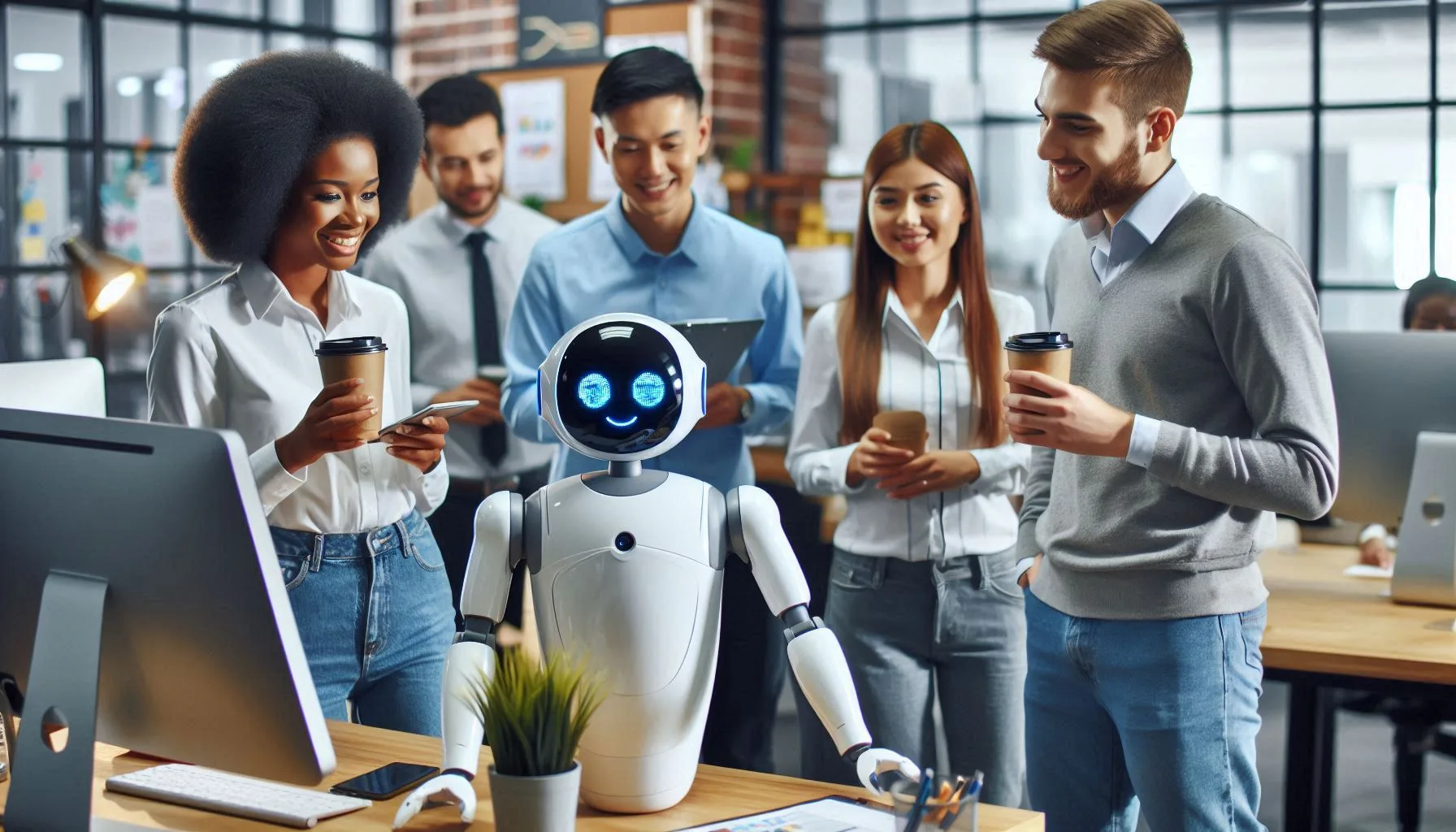Artificial Intelligence (AI) has transformed how companies operate, improving efficiency and reshaping industries globally. Companies across all sectors are investing in AI to enhance productivity, customer service, and decision-making. While the past laid the groundwork for AI, today’s businesses need to focus on how to integrate these technologies effectively and prepare for the future.
AI’s Role in the Present
Today, AI is no longer a distant dream but a reality. Companies now use AI in multiple ways, adapting their operations to stay competitive.
1. AI-Powered Automation
One of the most widespread uses of AI is automation. AI can handle repetitive tasks that once required human input, freeing up employees to focus on more creative work. Automation tools in AI-powered chatbots, customer service, marketing, and supply chain management streamline operations, reducing the workload. For instance, AI-driven automation tools can help manage large volumes of customer inquiries through chatbots, improving customer satisfaction.
2. AI in Data Analysis
Another vital area where companies use AI is in data analysis. With the growing amount of data being generated, AI tools are essential for analyzing and making sense of it. Machine learning algorithms analyze patterns, trends, and customer behaviors, helping companies predict market changes, understand their audiences, and optimize operations. AI can make sense of both structured and unstructured data, uncovering insights that can improve marketing strategies, operational efficiency, and product development.
3. Personalized Customer Experiences
AI is becoming a crucial tool in delivering personalized experiences to customers. With AI-powered recommendation engines, businesses can suggest products or services based on a customer’s browsing history, purchasing behavior, or interaction with their website. This personalization increases customer satisfaction, loyalty, and conversion rates. AI makes it possible for companies to provide a customer experience tailored to individual preferences.
4. AI in Cybersecurity
Cybersecurity is another field where AI is playing a crucial role. Companies are using AI to detect threats, identify patterns, and prevent cyberattacks. AI-powered cybersecurity systems can analyze vast amounts of data, spot anomalies, and respond to potential threats faster than humans. AI’s ability to adapt and learn over time improves the resilience of security systems, protecting businesses from constantly evolving digital threats.
5. AI in Human Resources (HR)
AI is revolutionizing the recruitment process by screening resumes, managing employee performance, and even predicting when employees are at risk of leaving. AI can analyze resumes for relevant skills, compare candidates to past successful employees, and ensure a diverse and qualified pool of applicants. HR departments use AI to improve employee satisfaction, retention, and performance.
6. AI in Predictive Maintenance
Many industries rely on machinery and equipment that must be maintained regularly. AI-driven predictive maintenance can analyze the condition of equipment and predict when it will fail. This technology minimizes downtime, reduces costs, and improves overall efficiency. AI systems can monitor machine health through data from IoT sensors and advise on when to perform maintenance, thus preventing costly breakdowns.
Future Trends in AI for Businesses
The future of AI promises even more innovation. As AI continues to evolve, companies must stay ahead by adapting to new trends and technologies.
1. AI and the Internet of Things (IoT)
AI combined with IoT will create smarter environments. Businesses can benefit from smart factories, offices, and supply chains, where machines, devices, and systems communicate seamlessly. AI can predict issues, optimize processes, and reduce energy consumption in real-time. For example, in manufacturing, AI and IoT together can create a fully automated system where machines are self-aware and capable of predicting the entire production process.
2. AI and Augmented Reality (AR)
AI will enhance the development of Augmented Reality (AR) experiences. Companies in retail, healthcare, and real estate are already experimenting with AI-driven AR solutions. In the future, AR combined with AI will provide more personalized and immersive experiences. Retailers will use AI-powered AR to allow customers to try products virtually before purchasing them. In real estate, potential buyers can take virtual tours of properties, while healthcare professionals can use AI and AR for training and diagnostics.
3. AI-Enhanced Decision Making
As AI technologies advance, businesses will rely more on AI to aid in decision-making processes. AI will analyze vast amounts of data in real-time and offer actionable insights, helping leaders make more informed decisions. In finance, for instance, AI can assess risk, optimize portfolios, and provide insights on market trends. In healthcare, AI can assist in diagnosing diseases, improving patient care, and reducing errors in treatment plans.
4. Natural Language Processing (NLP) and AI Assistants
The future of AI will see significant developments in Natural Language Processing (NLP), enabling machines to understand and communicate more like humans. AI-powered assistants will become even more intelligent, handling complex tasks and conversations. Companies can use these advanced AI assistants in customer service, data retrieval, and even internal communication, streamlining processes and enhancing productivity.
5. AI Ethics and Responsible AI Use
As AI becomes more advanced, businesses will need to consider the ethical implications of AI use. This includes ensuring data privacy, preventing algorithmic bias, and using AI responsibly. Future regulations might require companies to maintain transparency in their AI systems, making ethical AI development a critical focus. By investing in ethical AI practices today, businesses can gain trust and create sustainable long-term growth.
6. AI in Workforce Transformation
The integration of AI will reshape the workforce. While some fear that AI might replace jobs, it’s more likely that AI will transform roles. Many jobs will change as AI takes over routine tasks, but companies will need workers skilled in managing AI systems, programming, and data analysis. Companies will invest in upskilling and reskilling their workforce to ensure they can work alongside AI technologies.
Adapting to AI: How Companies Can Prepare for the Future
As AI continues to develop, companies need to adopt strategies that ensure long-term success. Here’s how they can adapt to this ever-changing landscape:
1. Invest in AI Research and Development
To stay competitive, businesses must invest in AI research and development. This includes testing new AI models, collaborating with AI specialists, and exploring emerging technologies. Staying ahead of AI advancements allows companies to adopt innovative solutions that can give them an edge in the market.
2. Adopt a Data-Driven Culture
AI thrives on data. Companies must adopt a data-driven culture, where decisions are made based on insights from data. By investing in data collection, storage, and analytics, businesses can make the most of AI technologies. Having clean, well-organized data is essential for training AI algorithms and getting accurate results.
3. Focus on Employee Training and Upskilling
As AI transforms industries, companies should focus on training their employees to work with these technologies. Upskilling employees ensures that they remain relevant in an AI-driven workforce. Employees trained in AI can help their company innovate and make the most of new technologies.
4. Ethical AI Practices
Companies must also focus on building AI systems that are ethical, transparent, and unbiased. As AI becomes more powerful, consumers and regulators will demand accountability. Companies should establish guidelines for the ethical use of AI, ensuring that their systems are fair, reliable, and do not discriminate.
5. Collaborate with AI Providers
Many companies lack the resources to develop AI technologies internally. Partnering with AI providers and consultants allows companies to integrate AI without needing in-house development. Collaborating with trusted AI firms can ensure that businesses get access to the latest AI tools and insights, helping them stay ahead of competitors.
Conclusion: The present and future of AI hold tremendous potential for businesses. By embracing AI technologies, companies can streamline operations, improve customer experiences, and drive innovation. The key to success lies in adopting AI responsibly, investing in employee training, and staying ahead of emerging trends.
By integrating AI into their strategy today, businesses can position themselves as leaders in an AI-driven world.




